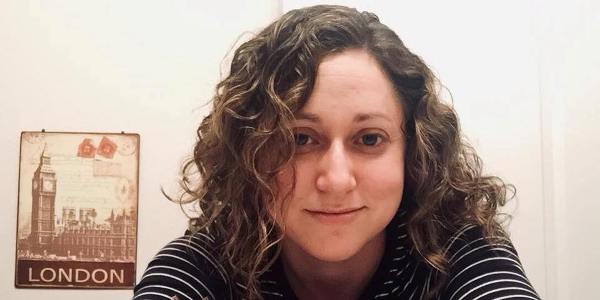I’ve decided to start doing author interviews on Facebook messenger in lieu of doing book reviews, which I’m terrible at. This interview is with Sarahbeth Caplin, who has written seven books, most notably her memoir about her faith journey as a secular Jew who became a Christian, then got caught up in a toxic evangelical college ministry where she met her husband Josh before they escaped together. The crazy thing we discovered through our interview is that a major part of Sarahbeth’s conversion experience was reading several teen Christian books she borrowed from my first cousin Mary Sley when they were neighbors growing up in Hudson, Ohio!!! It was a great conversation that I’m sure you’ll enjoy.
MG: So tell me about your book.
SC: Basically I got asked so many times in college what motivates a secular Jew to become a Christian, I started joking about writing a book…and eventually I did just that. It’s called Confessions of a Prodigal Daughter. Here’s the description: In a bittersweet twist of fate, I started out “too Jewish” for my Catholic friends in elementary school, but not Jewish enough for the kids I met at summer camp, with their youth group logos and wristbands. In Israel, I didn’t feel I had the right to call myself Jewish at all. Now I was too Christian for Jews everywhere, but still too Jewish to completely fit in with my new bible study friends. In my most pessimistic moments, I wonder if I’ll never fit in anywhere, with anyone. It’s interesting because Christians are called to be pariahs, to go against the ways of this world. But I am a special kind of pariah.
SC: Off topic, but I didn’t know you were a cousin of the Sleys until Sarah posted a link to your book, which I ordered. I grew up next door to them.
MG: What?!!! Did you know about their mixed Jewish Christian heritage?
SC: Yup. Their father is Jewish right?
MG: Right
SC: They didn’t really talk to me about that much. Probably because every time I left their house, it was always with an armload of Mary’s theology books. I actually still have one I never returned…
MG: Oh I didn’t know Mary had theology books. What were they like?
SC: Prayer of Jabez, the Columbine biographies, Chicken Soup stuff with a Christian bend. Not theology specifically.
MG: Right. So was that part of your whole becoming a Christian story?
SC: It started with books, yes. The market for Jewish books for teens was practically nonexistent. There was one Judaica shop that had lots more Jewish books you couldn’t find at Barnes and Noble, and before the internet my mom would drive me there, 45 minutes away. It closed when I was in high school.
MG: Wow. So what was in your mind as you were devouring these books? What did you think you were looking for?
SC: I wanted to be like the people I was reading about: Cassie Bernall, Rachel Scott, Joan of Arc. I wanted the Jewish equivalent of what they had and eventually just hit a wall
MG: And the first two girls were the Columbine girls?
SC: Right. I remember hiding Rachel’s Tears under my bed so my mom wouldn’t find it. Probably why I never returned it to Mary. It was in such poor condition I was too embarrassed.
MG: Ah… so how old were you when Columbine happened? Was Columbine impactful to you when it happened or was it reading about it after the fact?
SC: I was 11 I think. A few years after the fact, I don’t think the books even got written until the early 2000s. So I would have been in middle school by then
MG: So what was it about Rachel Scott that made her so attractive as a hero?
SC: Probably just because she seemed a lot like me. We could have been friends if we were closer in age. Similar interests, personalities. And unlike Joan of Arc, she wasn’t quite this larger than life, Wonder Woman-type figure who was declared a saint.
MG: So you read about the Columbine girls, you were inspired by their stories, and then what happened?
SC: I’d say it was mostly Rachel Scott and Joan of Arc that had the biggest impact. I came to the realization that the things I would need to develop the kind of faith my role models had just didn’t exist in my Jewish community. Girls like Rachel (a better example than 15th-century Joan of Arc in this regard) had youth groups, youth pastors, age-appropriate bible studies and stuff. Even community itself was lacking for me, since my synagogue was small and had very few kids in it. If most attendees were anything like my parents, they attended out of obligation, not spiritual devotion. My rabbi was pretty useless in helping me out with developing a spiritual life, but I can’t really blame her. I was an odd kid. I wanted a “personal relationship” with God and got told that Jews didn’t “have” that. Pretty crushing. Basically I was told if you’re Jewish and wanted more of God, you became Orthodox. Not at all what I was looking for. Judaism as I understood it was spiritually unfulfilling, which is funny because now that I’m reading more about it as an adult, I don’t feel that way anymore…but the God-in-the-flesh thing that Christians have still doesn’t exist in Judaism, and ultimately that was the biggest draw for me: a God who knew what it was like to be human and feel what humans feel.
MG: So a couple of weeks ago I read Chaim Potok’s The Chosen which is about an orthodox hasidic Jewish in Brooklyn in the 1940’s. I was captivated by the mystical aspects of the spirituality that was being described. As I’m reading your reflections and thinking about my own story, I’m realizing that what attracts me now would have bored me out of my mind at age 16. And this outrageous statement came into mind. What if Christianity is a religion for teenagers and Judaism is a religion for adults? At least the evangelical, personal, emotive version of Christianity that’s built around a rock concert worship service and heart-throb motivational speaker. How does that idea sit with you?
SC: I can see that. I’m drawn more to the liturgical denominations because the flow of the service is similar to what synagogue is like
MG: So when did you officially become a Christian and how did your family respond?
SC: Almost a decade ago…and now you’re asking for spoilers. They were not thrilled, and yet not surprised I think they were mostly afraid that I’d become one of those screaming street preachers yelling about how everyone is going to hell. We didn’t have the best examples of Christianity in our community so I think that fear was valid. From the classmates who “lovingly” wrote me notes about not going to hell, to the Jews for Jesus literature with my dad’s name on it that we would find in our mailbox, pamphlets on the windshield of our car after Shabbat services…low-key stuff, but still unsettling and unkind. Luckily my childhood wasn’t too anti-semitic.
MG: It sounds like your understanding of your spiritual longings has evolved over the decade since you became a Christian. Can you share a little bit about that without giving away the story?
SC: That’s pretty much asking for a book-length response. I’d say personal experience had a lot to do with it, from a borderline abusive experience in college ministry to a failed stint at seminary to my father’s death from cancer, all of which produced a sort of spiritual crisis.
MG: Is it all right to ask about your abusive campus ministry experience? I was in a toxic campus ministry myself.
SC: You’ve heard of Cru?
MG: Oh yeah! Some of my best friends are ex-Cru folks who bonded with me over our escape from toxic evangelicalism.
SC: That’s actually where I met my husband, so I guess it wasn’t all bad. But part of how we bonded was over how toxic our experiences were there.
MG: Right. So how long did it take you to figure out something wasn’t right?
SC: About a year. I thought the problem was me for not being godly enough.
MG: So what kind of pressure was there to be more godly?
SC: Mostly having to do with evangelism. Very manipulative evangelism.
MG: Ah did you have a quota of people to bring?
SC: No…just had to have the willingness to do it, which I didn’t. Not by their standards anyway. I tried it their way and just made enemies. Which of course was really “persecution.”
MG: Right. So was this the whole “find a way to bring Jesus up in every conversation” thing?
SC: The director at the time loved airplane and grocery line evangelism, or any situation in which you had a literal captive audience
MG: Ha. So did you ever try to do it to random strangers?
SC: I went around in groups on campus where others did most of the talking. Coming from the other side, I knew how students felt ambushed.
MG: I’ve often wondered how it’s ever actually worked. I guess if you’re in a vulnerable enough place, then a stranger can push you into a sinner’s prayer.
SC: I think the group went out of its way to target lonely freshmen away from home, with posters advertising pizza parties that mentioned nothing about the religious components. The posters were also under fire with the school for not printing their logo clearly enough, per university requirements. So people read ‘pizza party’ and had no idea it was sponsored by a Christian group.
MG: Yup. So given your unique spiritual journey and hybridity of heritage, is there a form of evangelism that you would feel comfortable with today?
SC: I wouldn’t call it evangelism so much as simply being myself. I talk about faith the way most people talk about their interests and personal relationships. But writing about faith is definitely something I’m better at than speaking about it.
MG: Right. So let me make this a loaded question that I’m thinking about asking my incoming student leaders in my campus ministry this weekend as we plan for the spring: do you think people need Jesus and if so why? Your answer may help me decide whether to ask the question or not.
SC: Yes, because I think mankind is in desperate need of redemption. I don’t believe in total depravity, however. If people followed Jesus’ example of humility and servitude I think we would have a much better world. I had to think about my answer…not sure what the implications are there.
MG: So what does Christian salvation look like to you now?
SC: I share C.S. Lewis’ thoughts on this – if Jesus is the only way, we’ll be very surprised at who we see in heaven, because sometimes non-Christians demonstrate better understanding of the heart of Christ than a lot of self-proclaimed Christians do.
MG: I hear that and agree with that. I’m what they call a “hopeful inclusivist.”
SC: I don’t know if that answers your question. To be honest, I’m still working through a lot of this. I got messages out of ‘love’ from certain people when my father was dying, asking if he was ‘saved’ yet. The thought of suffering for eternity just for believing the wrong things really enraged me. Especially when he suffered for 13 years with cancer.
MG: Absolutely. I’m still trying to figure out a better narrative of salvation myself. Where do Jesus’ cross and resurrection fit into the picture for you? Note: I’m asking not as an evangelical litmus-tester but a post-evangelical exile trying to find a better story.
SC: Not really sure how to answer that. The cross is tricky for me. On the one hand, it’s the event that kick-started a long history of anti-semitism. That’s a big reason I don’t wear a cross. On the other hand, Christianity was instrumental in providing a context for my own suffering – and the understanding that it can be redeemed.
MG: Ah yeah, the anti-semitism was totally not on my radar screen.
SC: I’ve struggled for most of my adult life with suicide and depression, so the narrative of redemption has been more than just helpful or inspirational. It’s been a literal lifeline. Just one reason why the prosperity gospel never made sense to me…I’ve known plenty of people who praise God for finding foreclosed homes that sell super cheap, dollars on the sidewalk, and lost car keys, and I’m like…are we reading the same bible?
MG: So what are you writing about now?
SC: I’ve stepped away from book writing for the time being to focus on freelancing. I actually write for an atheist blog, mostly news-related pieces having to do with religion, and for the Huffington Post.
MG: Ah interesting. How has this experience of writing religion news interfaced with your spiritual evolution?
SC: It’s weird that I’m making more money than I ever did writing for a blog that reaffirms why a lot of people left religion…not exactly what I dreamed of doing. But it’s a lot of topics I’d be speaking out against anyway, like the evangelical worship of Donald Trump. If anything I hope it’s encouraging to the atheist audience that there are Christians out there who are just as outraged as they are.
MG: Right. How do you hold onto hope when there’s so much to be cynical about in religious news?
SC: I really don’t know! lol I guess because I need to. I’d go insane otherwise
MG: Indeed. So if you could sit down with your eighteen-year-old Cru-indoctrinated self, what would you say to her?
SC: Stay long enough to meet Josh; then leave.
MG: Haha. Sounds like a variation on what my youth pastor friend used to say, “Come for the girls and stay for God.” I guess sometimes you come for God, find the life partner, and get out.
SC: Took a little longer than it should have.
MG: So is there anything else you’d like to add or talk about?
SC: This post may be helpful in answering some questions on the spiritual side of things.
And here’s an excerpt from the book.
Thank you Sarahbeth Caplin!!!
Please buy her book on Amazon here!!!













